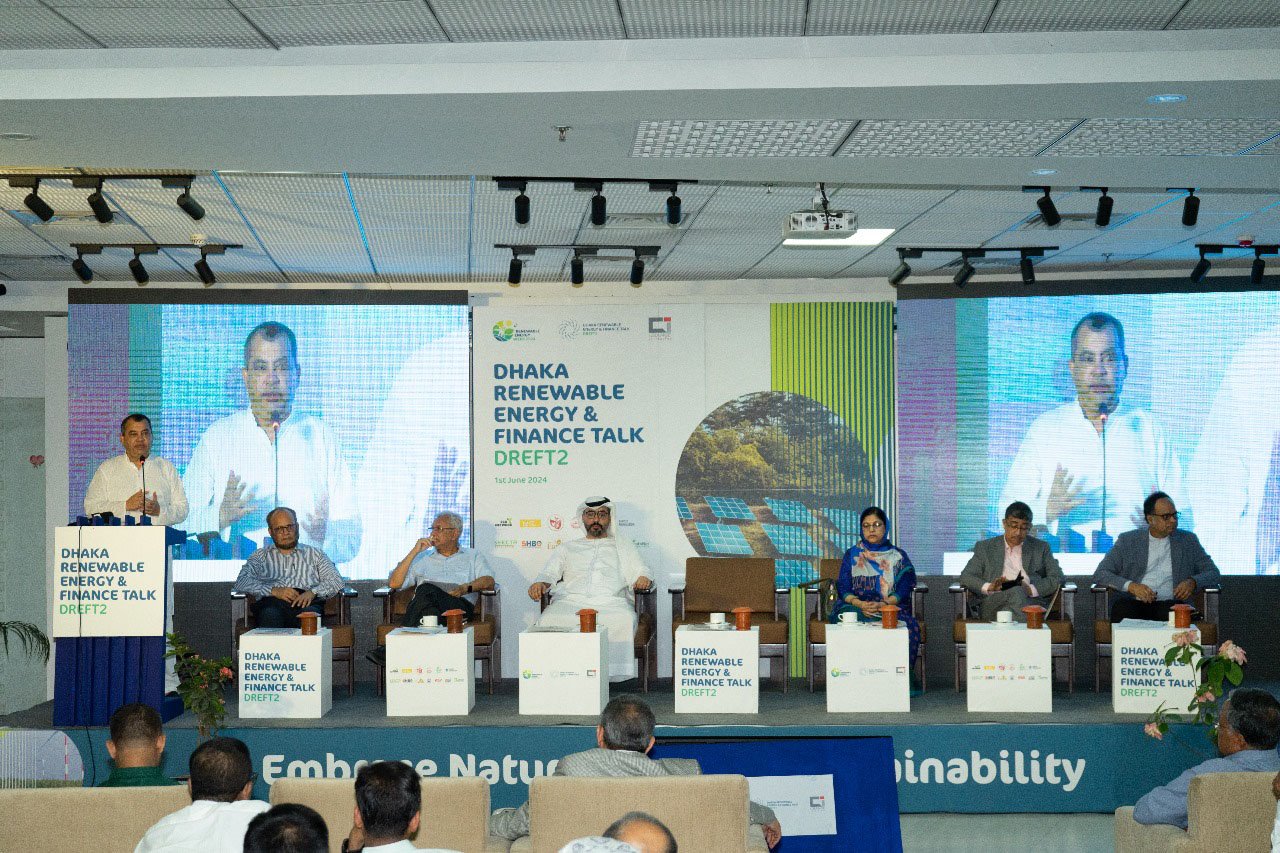
The Dhaka Renewable Energy and Finance Talk (DREFT) is a signature event of Change Initiative (CI), which aims to emphasize the necessity for a nature-friendly energy supply and the essential steps and commitments required from governments, private sector entities, and civil society to achieve a just and effective energy transition. A significant focus of the Talk is on expanding the knowledge about the potential of renewable energy (RE) and mobilizing enhanced access to finance for ensuring long-term economic well-being, ecological balance, and energy sovereignty through nature-based resources. DREFT2 highlighted the importance of collaborative efforts, innovative policies, and substantial investments in achieving Bangladesh's renewable energy goals, ensuring a sustainable and equitable energy future for all.
Change Initiative successfully organized and executed the 2nd Dhaka Renewable Energy and Finance Talk (DREFT2) on June 1, 2024, at the Bangabandhu Military Museum, Dhaka, in collaboration with in collaboration with The Earth Society, Institute of Energy and Sustainable Development (IESD) of BUET, Nature Conservation Management (NACOM), and youth partners- Eco-Network Global, Green New Deal Hub Kushtia, Janakallayan Sangstha, Nirvoy Foundation, SEECTO Bangladesh, SHBO, World Youth Army, Youth4NDC's, YouthNet, Youth Action for Social Development – YASD. Around 50 national and international policymakers, experts, industry leaders, financers, governance experts, and economists have contributed throughout the day. Noted that under the guidance and support of Change Initiative youth organizations observed the Renewable Energy Week (REW) from 26th May to 1st June. The REW activities aimed to promote renewable energy and engage youths in creating a sustainable environment.
The Change Initiative's inaugural DREFT1 event in 2023 has yielded several significant outcomes, including the prioritization of aligning renewable energy efforts with the Paris Agreement to foster economic well-being, ecological balance, and energy efficiency. The event shifted mindsets about the potential of renewable energy for sustainable growth and established a dedicated Renewable Energy Fund (REF) to support the transition. Additionally, the event identified a $38.44 billion funding potential over the next decade, crucial for meeting the renewable energy targets outlined in the Mujib Climate Prosperity Plan (MCCP).
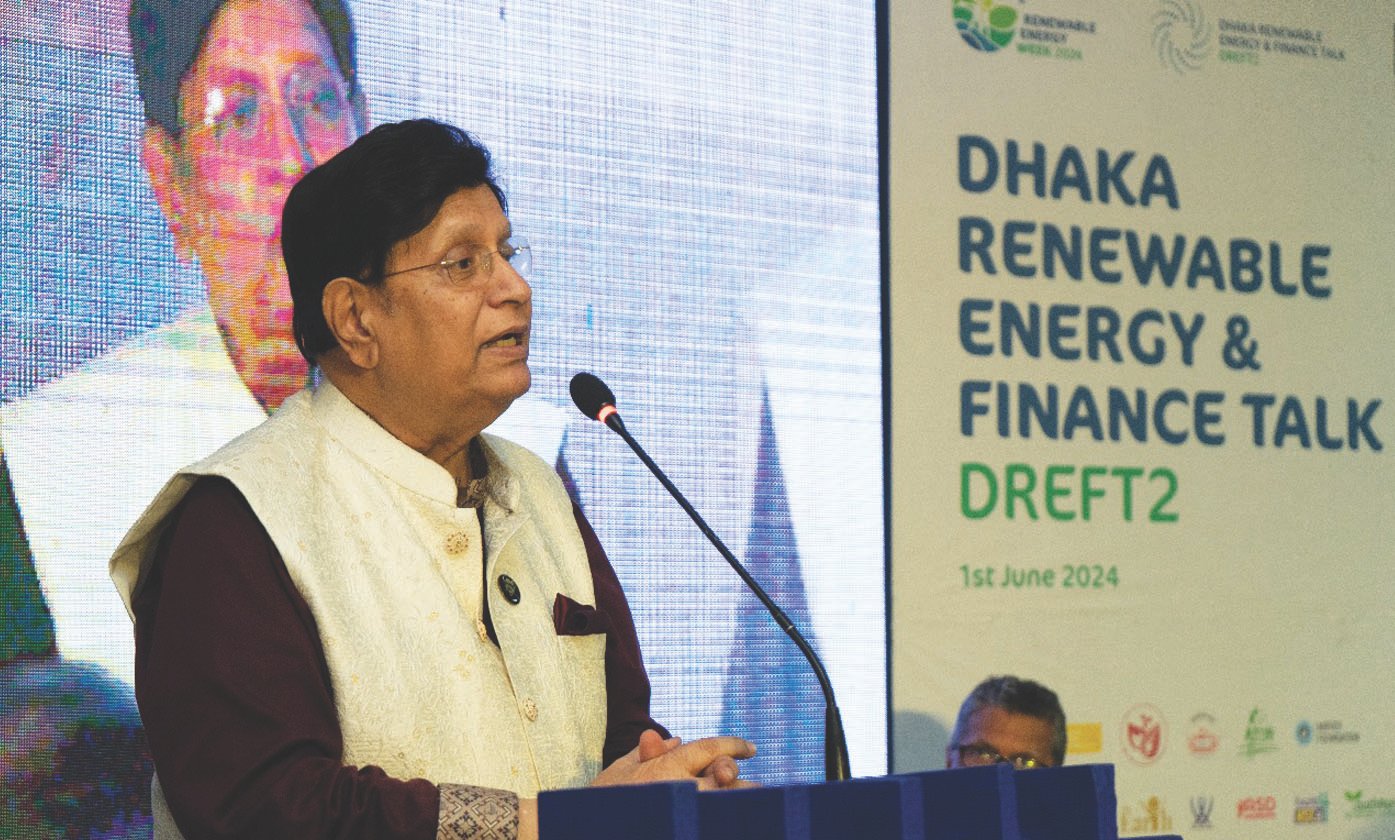
The DREFT2 aimed to chart a sustainable and equitable path for Bangladesh’s energy future by redirecting fossil fuel subsidies to renewable energy. Featuring 55 panel speakers, the event was attended by approximately 250 participants. The full-day conference began with a recap of the inaugural DREFT2 followed by the keynote speech presented by Zain Moulvi, Research Director of Alternative Law Collective, and a spotlight on the current edition by M Zakir Hossain Khan, Chief Executive of Change Initiative, highlighting the potential of redirecting fossil fuel subsidies. M Zakir Hossain Khan also presented the Global Renewable Energy Fund (GREF) framework developed by CI at the occasion.
In COP28, 200 countries made major collective pledges on energy in Dubai to keep within reach the Paris Agreement target of limiting global warming to 1.5 °C. With $7 trillion annually spent on global fossil fuel subsidies, despite 57 companies producing 80% of global CO2 emissions, urgent action is needed. LDCs have called for the withdrawal of at least 50% of the $1 trillion annual public subsidies of G20 to fossil fuels by 2025. In terms of the adverse impacts, climate change threatens 20% of global GDP by 2050, with GHG emissions and air pollution costing $8 billion daily. These subsidies also hinder the growth of renewable energy by masking the true costs of fossil fuels, making them appear more attractive and thereby slowing the transition to green energy sources However, about $4.5 trillion a year is required for renewable energy (including technology and infrastructure) until 2030 to reach net-zero emissions by 2050. Due to immense climate finance gaps and for meeting increased demand for required grant-based public climate finance the DREFT2 theme focused on redirecting fossil fuel subsidies to renewable energy expansion, especially in LDCs. Redirecting subsidies can mitigate these risks and accelerate the transition to sustainable energy sources. Reducing and redirecting fossil fuel subsidies is crucial due to several compelling reasons. Geopolitically, with 80% of the global population reliant on imported fossil fuels, countries become vulnerable to supply disruptions, access issues, and price volatility.
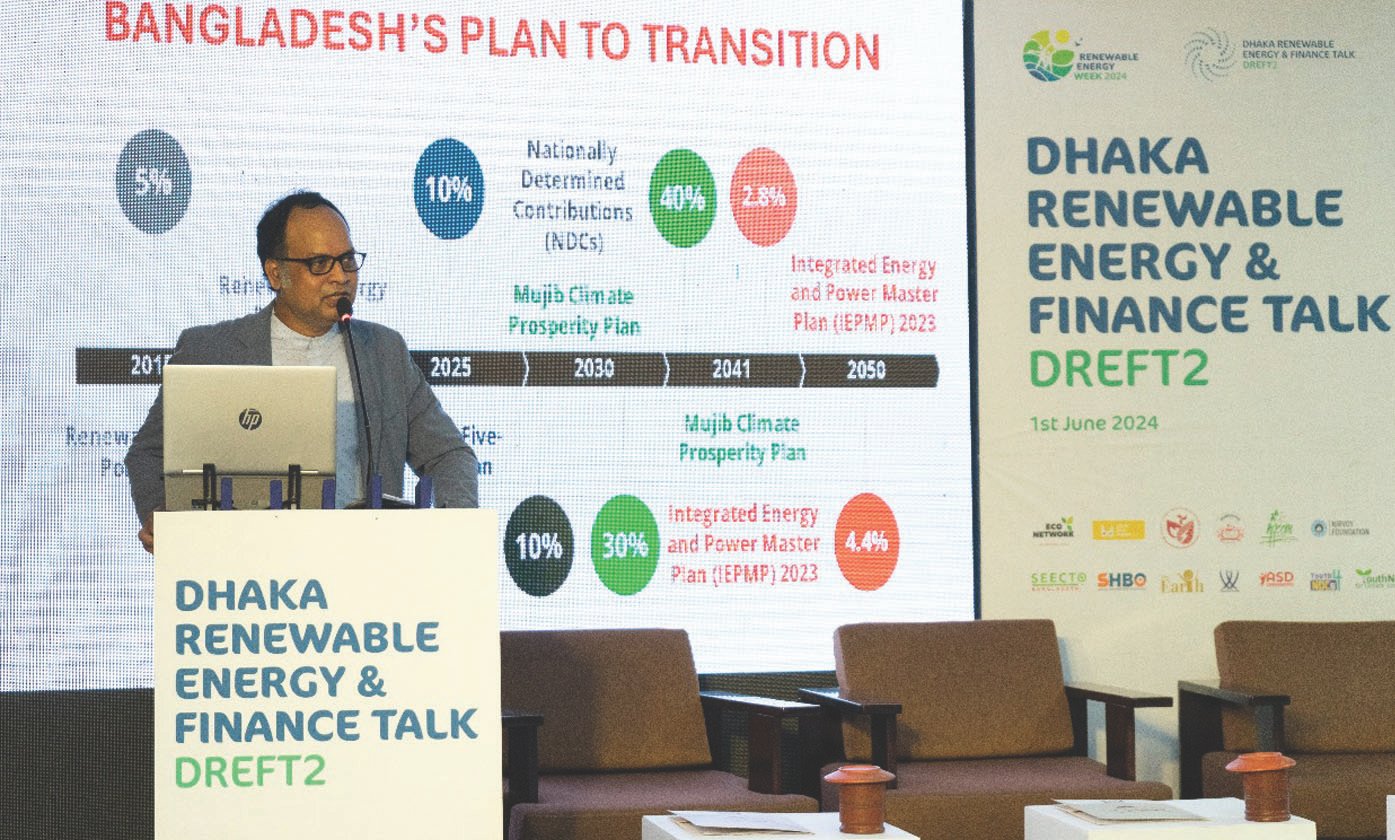
Although the COP28 outcome did not include numerical targets, Ember says tripling renewables would mean adding 14,000TWh of annual renewable generation by 2030, compared to 2022 levels. In 2022, renewables accounted for 8,599TWh of the 28,844TWh of electricity generated globally. After accounting for rising electricity demand, it says this tripling would help cut fossil fuel generation by 6,570TWh, or 37%. With highly polluting coal power bearing the brunt of this reduction, power sector emissions would fall even faster, by 45% in 2030.
The Chief Guest for the Opening Session, Saber Hossain Chowdhury MP, Honourable Minister of the Ministry of Environment, Forest and Climate Change (MOEFCC), emphasized the critical importance of transitioning to renewable energy for Bangladesh's sustainability, highlighting the government's commitment to reducing fossil fuel reliance and promoting renewable sources. His speech called for innovative policies, substantial investments, and international cooperation to achieve the nation's renewable energy goals, inspiring active participation from attendees.
The event was honored by several distinguished guests: H.E. Abdulla Ali Abdulla Khaseif AlHmoudi, UAE Ambassador to Bangladesh, who stressed the importance of global cooperation for sustainable energy; Dr. Md. Mustafizur Rahman from the Industry and Energy Division of the Planning Commission, who provided insights into integrating renewable energy into the national framework; Munira Sultana Ndc, Chairman of SREDA, who discussed SREDA's role in promoting and regulating renewable energy projects; and Mamun Rashid, Chairman of Financial Excellence Limited, who highlighted the need for innovative financing solutions to attract investments in the renewable energy sector.
The transition to renewable energy is not only a necessity but also an opportunity for economic growth, social equity, and environmental sustainability.
To wrap up the closing session, Dr. A K Abdul Momen MP, Chairman of the Standing Committee on the Ministry of Foreign Affairs, delivered the closing remarks, emphasizing international cooperation and innovative financing for renewable energy.
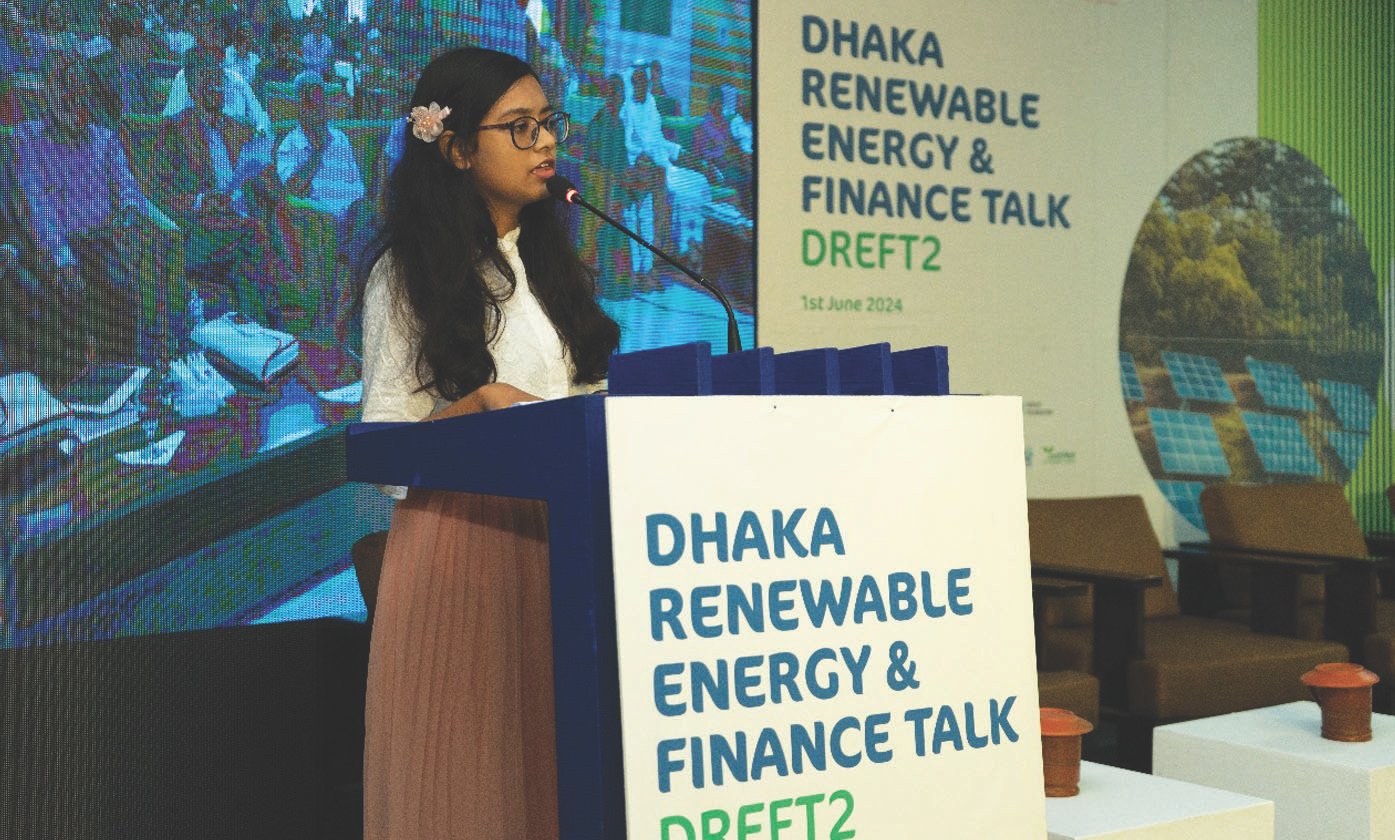
Key learnings and observations from the event included a call for reducing fossil fuel subsidies, with G-20 countries providing one trillion dollars annually to fossil fuels. It was proposed that 50% of these subsidies, amounting to 500 billion dollars, be allocated to climate action in developing countries. Despite not being responsible for climate change, Bangladesh suffers significantly and allocates substantial funds to the Climate Change Fund, impacting its capacity to achieve sustainable development goals. Bangladesh aims to adopt renewable energy technologies to reduce carbon emissions, which may reach 1% of global emissions next year. M Zakir Hossain Khan summarized the day's key takeaways, including redirecting fossil fuel subsidies and ensuring social equity in the energy transition. He also issued a call to action, urging continued efforts and collaboration for meeting sustainable energy goals.
Call to Action
1) Diversion of Public Subsidy to Fossil Fuels by G20: Each year, the G20 countries mobilize around USD 1 trillion. However, in COP28, there was an agreement to limit global warming to 1.5 °C by 2030, and the New Climate Finance Quantified Goal (NCQG) has targeted enhanced climate finance starting in 2025. However, to address the ongoing grant-based adaptation finance gap and renewable energy expansion in the LDCs, at least the funds mobilized should be five times higher than those of US$100 billion going forward up to 2025. 50% of the public subsidy (US$250 billion) can be used for climate adaptation and resilience in the LDCs to contribute to the NCQG that has proposed to include new and additional ODAs, primarily public grant-based ODAs and OOFs, or finance for adaptation, as well as loss and damages in the LDCs and SIDS.
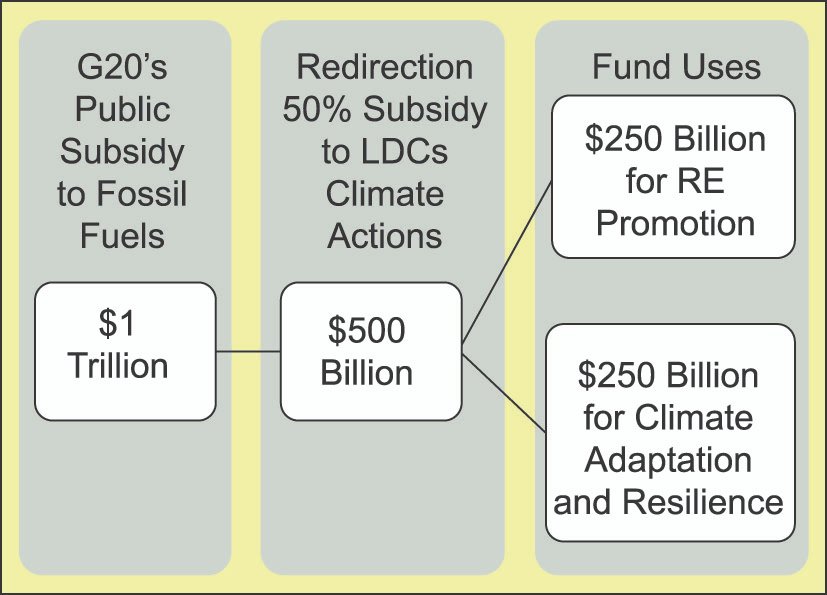
2) Establishing a Global Renewable Energy Fund (GREF): Aligning with the objective of the Global Renewable Alliance (GRA) to triple global renewable energy capacity by 2030, the DREFT2 strongly urges the establishment of the dedicated Global Renewable Energy Fund (GREF) to support the mitigation efforts of the climate-vulnerable LDCs. The GREF can be created based on 50% (USD 250 billion) of the overall public subsidy to fossil fuels by the G20. This fund should prioritize accessibility, responsiveness, and equitable governance. Existing institutions, such as the International Renewable Energy Agency (IRENA), could play a key role in managing this fund.
3) Fossil Fuel Global Accountability: We call upon key fossil fuel companies[i] to make meaningful and time-bound commitments to transition towards renewable energy-based energy services. These commitments must be transparent, accountable, and subject to independent verification to ensure genuine progress. Regulatory bodies and international organizations should establish stringent oversight mechanisms to monitor and enforce these commitments.
4) Carbon Tax on Fossil Fuel Uses: We urge the implementation of equitable and progressive carbon taxes on fossil fuel promoters and producers to achieve both targets to mobilize required climate finance as well as to keep the global temperature rising to 1.5 degrees Celsius by 2030. Revenue generated from these taxes should be directed towards supporting the resilience of vulnerable communities, investing in community-level renewable energy infrastructure, and offsetting regressive impacts. International financial institutions and MDBs should provide technical and financial support to design and implement effective tax systems in the LDCs.
5) Exploring Ocean Energy Potential: We call for increased investment in research and international collaboration to explore the vast potential of ocean energy. Countries like Bangladesh should prioritize the development of pilot projects and attract investment to harness this untapped resource. International bodies should support these efforts through funding and knowledge exchange.
6) Unlocking Green and Sustainable Finance: Innovative financing mechanisms are crucial to attracting diverse capital for renewable energy projects. We advocate for the widespread adoption of blended finance, green bonds, crowdfunding, and results-based financing. Governments and financial institutions should collaborate to create enabling environments that foster these innovative financing models, ensuring accessibility and affordability for LDCs.
7) Equitable, Participatory, Timebound Resourced Just Energy Transition in the LDCs: A time-bound, equitable, localized, and resource-focused transition strategy, particularly for the LDCs, is required. Strong governance and transparent regulations are vital for attracting investment and ensuring access to affordable, reliable, and sustainable modern energy. Renewable energy initiatives must prioritize just and equitable benefits for marginalized communities.
We emphasize decision-making processes around energy transitions, community-led initiatives, local innovations, competitiveness, and equitable access to energy and employment. Empowering communities through participatory approaches and capacity-building programs is essential for a just transition.
We call for the establishment of streamlined competitiveness for the renewable energy supply and generations, keeping nature and local ecology conserved, and ensuring the heritage and indigenous communities’ rights. Governments must prioritize governance reforms that promote accountability, fair competition, and stakeholder engagement.
8) Developing a Strategic Transition Roadmap: A clear and strategic roadmap is essential for achieving 100% renewable energy. We urge governments to establish specific targets, timelines, and investment plans for grid modernization and storage solutions. This roadmap should be developed through inclusive processes, incorporating input from all relevant stakeholders.
9) Enabling Environment for Effective Renewable Energy Finance: Innovative policies are required to address land scarcity for renewable energy projects. We recommend exploring options such as land imports, community ownership models, and the utilization of underutilized spaces like rooftops and water bodies. Policymakers should engage with local communities to develop inclusive and sustainable land access solutions.
10) Promoting Regional Energy Cooperation: Regional power exchange agreements can significantly mitigate energy shortages, maximize renewable energy use, and enhance energy security. We encourage the formation of regional alliances and frameworks that facilitate the sharing of energy resources, drawing on successful examples such as Nepal's winter surplus energy exchange.
The transition to renewable energy is crucial for both environmental and economic development, social equity, and environmental sustainability. This Call for Action emphasizes the need for concerted and collective commitments to achieve a just and sustainable future. Let us work together to make this vision a reality, ensuring a cleaner, safer, and more equitable world for future generations.
Zakir Hossain Khan, International Climate Finance Analyst and Chief Executive, Change Initiative; Email: zhkhan@changei.org; Maisha Chowdhury and Sadman S. Khalili are engaged as employees of the communication and development of Change Initiative



